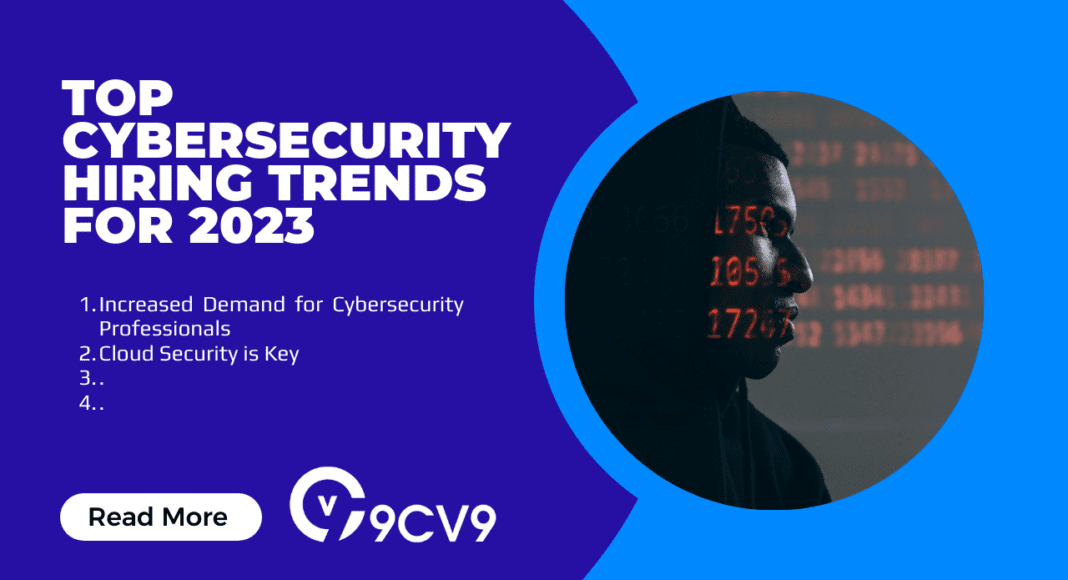The number of cybersecurity jobs will grow by 35% between 2021 and 2031
– U.S. Bureau of Labor Statistics
In today’s digital age, cybersecurity has become one of the most critical aspects of any organization’s operations.
As businesses increasingly rely on technology to conduct their daily activities, the need for skilled cybersecurity professionals has skyrocketed.
From protecting sensitive data to preventing cyber attacks, cybersecurity professionals play a vital role in ensuring the safety and security of an organization’s digital infrastructure.
As we move into 2023, it’s essential for companies to stay up-to-date with the latest cybersecurity hiring trends to attract top talent and maintain a robust cybersecurity strategy.
In this blog post, we’ll explore the top cybersecurity hiring trends for 2023 and provide insights into how companies can adapt and thrive in the ever-evolving cybersecurity landscape.
One of the most significant trends we’re seeing in the cybersecurity industry is the increased demand for skilled cybersecurity professionals across a variety of industries.
From finance to healthcare to government, organizations are recognizing the importance of investing in cybersecurity to protect their digital assets.
With high-profile data breaches and cyber-attacks becoming more frequent, the need for skilled cybersecurity talent has never been greater.
Another critical trend in the cybersecurity industry is the emphasis on diversity and inclusion.
As the industry continues to grow, there’s a recognition that diversity and inclusion are not only ethical imperatives but also essential for building a robust cybersecurity strategy.
Companies are starting to invest in initiatives and programs aimed at increasing diversity in the field, and we’ll explore some of the specific programs and initiatives in this blog post.
We’re seeing an increased need for specialization in the cybersecurity industry.
As the field continues to grow and evolve, there’s a recognition that cybersecurity professionals need to have specialized knowledge in specific areas, such as cloud security, IoT security, and identity and access management.
Companies are starting to invest in specialized talent to keep up with these emerging trends.
Overall, the cybersecurity industry is rapidly evolving, and companies that stay ahead of the curve will be best positioned to protect their digital assets.
By staying up-to-date with the latest cybersecurity hiring trends, companies can attract top talent and build a robust cybersecurity strategy that will keep them ahead of the curve.
In this blog post, we’ll explore the top cybersecurity hiring trends for 2023 and provide insights into how companies can adapt and thrive in this ever-changing landscape.
Before we venture further into this article, we like to share who we are and what we do.
About 9cv9
9cv9 is a business tech startup based in Singapore with a strong presence all over the world.
With over six years of startup and business experience, and being highly involved in connecting with thousands of companies and startups, the 9cv9 team has listed some important learning points in this overview of the top cybersecurity hiring trends for 2023.
If your company needs recruitment and headhunting services, you can use 9cv9 headhunting and recruitment services to hire top talents and candidates. Find out more here, or send over an email to [email protected].
Top Cybersecurity Hiring Trends for 2023
- Increased Demand for Cybersecurity Professionals
- Cloud Security is Key
- Threat Intelligence and Incident Response
- Diversity and Inclusion
- Upskilling will be Important to Cybersecurity
- AI in Cybersecurity
- Need for Specialisation
1. Increased Demand for Cybersecurity Professionals
The demand for skilled cybersecurity professionals has been steadily increasing in recent years, and this trend is set to continue in 2023.
U.S. Bureau of Labor Statistics projects that the number of cybersecurity jobs will grow by 35% between 2021 and 2031.
Amidst the backdrop of companies firing and terminating staff, this statistic is pretty sanguine and demonstrates the demand for cybersecurity staff.
Furthermore, there are about 3.5 million open cybersecurity jobs, according to Cybersecurity Ventures, showing the robustness of the cybersecurity industry pertaining to hiring roles.
With the rise of cyber-attacks and data breaches, companies across various industries are recognizing the importance of investing in cybersecurity to protect their digital assets.
In 2018, SingHealth, Singapore’s largest group of healthcare institutions, suffered Singapore’s worst cyber attack then. As a result, the personal information of approximately 1.5 million patients, including the outpatient prescriptions of Prime Minister Lee Hsien Loong and some ministers, was compromised by unauthorized third parties.
As a result, the need for cybersecurity professionals has skyrocketed, and job growth in the industry is projected to continue to outpace other industries.
The financial industry, healthcare sector, and government agencies are among the sectors experiencing a particularly high demand for cybersecurity talent.
With financial institutions handling vast amounts of sensitive data and healthcare providers storing personal health information, these industries are particularly vulnerable to cyber-attacks.
Government agencies are also increasingly focused on cybersecurity, with cybersecurity being a top priority for many agencies.
One factor driving the increased demand for cybersecurity professionals is the rise of remote work and cloud computing.
With more employees working remotely, companies are relying more heavily on cloud computing to store and access data.
This has created new security challenges, and companies need skilled cybersecurity professionals to help them navigate these challenges.
The shortage of skilled cybersecurity professionals is a significant challenge for many organizations, and the competition for top talent is fierce.
This has led to higher salaries and benefits packages for cybersecurity professionals, making it even more challenging for some companies to attract and retain talent.
In conclusion, the demand for skilled cybersecurity professionals continues to rise, and this trend is set to continue in 2023.
Companies across various industries are recognizing the importance of investing in cybersecurity to protect their digital assets, and the need for skilled cybersecurity talent is at an all-time high.
As a result, cybersecurity professionals can expect to see increasing demand for their skills, and companies must be prepared to compete for top talent in the industry.
Data Breaches
In recent years, high-profile data breaches and cyber attacks have become increasingly common, with companies of all sizes and across all industries falling victim to these attacks.
And in September 2022, according to reports, cybercriminals who are suspected to be part of a state-sponsored operation successfully breached the internal network of Optus, a telecommunications company. As a result, the personal information of up to 9.8 million customers has been compromised.
Furthermore, The Australian National University (ANU) experienced a highly sophisticated cyber attack that surprised even the most seasoned security professionals in Australia. The attackers gained access to sensitive information that dated back 19 years by deploying four separate spear-phishing campaigns to harvest network access credentials from staff.
These incidents have had a significant impact on the need for skilled cybersecurity talent.
When a company experiences a data breach or cyber attack, the consequences can be severe.
Not only can these incidents result in financial losses, but they can also damage a company’s reputation and erode customer trust.
In some cases, the fallout from a data breach can be severe enough to lead to the company’s closure.
As a result, companies are recognizing the importance of investing in cybersecurity to prevent these incidents from occurring.
They need skilled cybersecurity professionals to help them identify and address vulnerabilities in their systems, monitor for potential threats and respond to incidents when they occur.
In addition, high-profile data breaches and cyber attacks have helped to raise awareness about the importance of cybersecurity, both within organizations and in society at large.
As people become more aware of the potential risks and consequences of cyber attacks, they are more likely to demand that companies take cybersecurity seriously and invest in skilled professionals to protect their data.
High-profile data breaches and cyber attacks have had a significant impact on the need for skilled cybersecurity talent.
Companies are increasingly recognizing the importance of investing in cybersecurity to protect their digital assets and maintain customer trust.
As a result, the demand for skilled cybersecurity professionals is on the rise, and this trend is set to continue in 2023 and beyond.
2. Cloud Security is Key
As more companies move their data and applications to the cloud, the demand for skilled professionals with expertise in cloud security is increasing rapidly.
According to Check Point’s 2022 Cloud Security Report, 27% of organizations have experienced a security incident in their public cloud infrastructure within the last 12 months. Of these mishaps, nearly a quarter (23%) were caused by security misconfigurations in cloud infrastructure.
Cloud security involves securing data, applications, and infrastructure that are hosted on cloud platforms such as Amazon Web Services (AWS), Microsoft Azure, and Google Cloud Platform.
Cloud security is a complex and rapidly evolving field, with new challenges emerging as cloud technology continues to evolve.
96% of organizations have experienced significant challenges when implementing their cloud strategy.
Companies need skilled professionals who understand the unique security challenges of cloud environments and who can help them develop and implement effective security strategies.
One of the biggest challenges of cloud security is the shared responsibility model.
In a cloud environment, the cloud service provider is responsible for securing the underlying infrastructure, while the customer is responsible for securing the data and applications that they host on the cloud.
This requires a deep understanding of both the cloud provider’s security capabilities and the customer’s security needs.
In addition, companies are increasingly relying on cloud-native security tools and services to help them secure their cloud environments.
These tools and services require specialized expertise to configure and maintain effectively, creating a need for professionals with expertise in cloud security.
In conclusion, the increased adoption of cloud technology is driving a high demand for professionals with expertise in cloud security.
Companies need skilled professionals who understand the unique security challenges of cloud environments and who can help them develop and implement effective security strategies.
As cloud technology continues to evolve, the demand for cloud security expertise is only going to increase, making it a lucrative and rewarding career path for cybersecurity professionals.
3. Threat Intelligence and Incident Response
Threat intelligence and incident response are critical components of any effective cybersecurity strategy.
Threat intelligence involves gathering and analyzing data on potential threats and vulnerabilities, while incident response involves responding to security incidents when they occur.
According to Kroll, the incident of phishing has been rising and unauthorized access increasing from 18% in 2021 to 25% in 2022.
The importance of threat intelligence has grown in recent years, as cyber threats have become more sophisticated and targeted.
Companies need to have a deep understanding of the threat landscape to effectively protect their digital assets.
Threat intelligence professionals gather and analyze data on emerging threats, vulnerabilities, and attacker tactics, providing companies with the information they need to stay ahead of potential threats.
Incident response is also becoming increasingly important, as cyber-attacks become more frequent and more sophisticated.
Companies need to be prepared to respond quickly and effectively when a security incident occurs, in order to minimize the damage and prevent further attacks.
Incident response professionals help companies develop and implement incident response plans, as well as provide hands-on support when incidents occur.
The demand for professionals with expertise in threat intelligence and incident response is growing rapidly, as companies recognize the importance of these disciplines.
Companies are looking for professionals with a deep understanding of the threat landscape, as well as the technical skills and experience needed to effectively respond to security incidents.
In conclusion, threat intelligence and incident response are critical components of any effective cybersecurity strategy.
With cyber threats becoming more sophisticated and frequent, companies need to be prepared to quickly and effectively respond to incidents.
This requires skilled professionals with expertise in threat intelligence and incident response, making these areas highly sought-after by employers.
As the cybersecurity industry continues to evolve, the demand for professionals with expertise in these areas is only going to increase.
4. Diversity and Inclusion
Diversity and inclusion are important topics in many industries, and the cybersecurity industry is no exception.
With a shortage of skilled cybersecurity professionals, it’s more important than ever to ensure that the industry is welcoming to a diverse range of talent.
Diversity and inclusion can bring a variety of benefits to the cybersecurity industry.
A diverse workforce can bring fresh perspectives and new ideas, which can help companies to stay ahead of the rapidly evolving threat landscape.
In addition, research has shown that diverse teams are more creative and innovative, and can make better decisions than homogenous teams.
In order to create a more diverse and inclusive cybersecurity industry, companies are taking a variety of steps.
They are recruiting from a wider range of backgrounds and experiences, and are implementing training and mentoring programs to support underrepresented groups.
They are also working to create a more inclusive workplace culture, with policies and practices that support diversity and inclusion.
The importance of diversity and inclusion is also being recognized by governments and industry associations.
They are working to promote diversity and inclusion in the cybersecurity industry, with initiatives such as scholarships and mentorship programs for underrepresented groups.
In conclusion, diversity and inclusion are critical to the success of the cybersecurity industry.
A diverse workforce can bring fresh perspectives and new ideas and can help companies stay ahead of the rapidly evolving threat landscape.
As the industry continues to grow and evolve, it’s important that companies take steps to create a more diverse and inclusive workplace culture, in order to attract and retain a wide range of talented cybersecurity professionals.
More Women joining CyberSecurity
While the cybersecurity industry has traditionally been male-dominated, there has been a growing trend of more women joining the field in recent years.
Globally, about 25% of women hold cybersecurity jobs, according to Cybersecurity Ventures.
Women are finding success in a variety of roles, including threat intelligence, incident response, and security engineering.
“What we are seeing today in the universities is the increase of women talent out there is close to 50-50 right now with the men,” Andrew Newman, chief technology officer at ReasonLabs, tells Fortune
There are several reasons why more women are joining the cybersecurity industry.
One is the increasing awareness of cybersecurity threats, and the need for skilled professionals to combat those threats.
As more companies recognize the importance of cybersecurity, they are looking to hire a wider range of talent, including women.
According to Fortune, large organizations like Microsoft Security are also prioritizing hiring more women who are cybersecurity professionals.
In addition, there are many organizations and initiatives working to encourage women to pursue careers in cybersecurity.
These programs offer training, mentorship, and networking opportunities, helping women to gain the skills and experience they need to succeed in the field.
While there is still a long way to go in terms of achieving gender diversity in the cybersecurity industry, there are many reasons to be optimistic.
Women are making significant contributions to the field, and are being recognized for their expertise and leadership.
The cybersecurity industry is seeing an increasing number of women joining the field and making significant contributions in a variety of roles.
With the growing recognition of the importance of cybersecurity, and the availability of programs and initiatives aimed at encouraging women to pursue careers in the field, the trend of more women joining the cybersecurity industry is likely to continue.
5. Upskilling will be Important to Cybersecurity
The cybersecurity industry is constantly evolving, with new threats and technologies emerging on a regular basis.
As a result, it’s important for cybersecurity professionals to stay up-to-date with the latest trends and best practices in the industry.
One way to do this is through upskilling.
Previously, we wrote about some top strategies on how to upskill your workers and team here.
Upskilling involves developing new skills and knowledge to stay relevant and competitive in the job market.
This can include pursuing advanced certifications, attending industry conferences and training sessions, and participating in online learning programs.
Upskilling is particularly important in the cybersecurity industry, where the threat landscape is constantly changing.
Cybersecurity professionals need to stay current with the latest threats and technologies, in order to effectively protect their organizations from cyber attacks.
In addition, upskilling can help cybersecurity professionals advance their careers.
By developing new skills and expertise, they can take on more challenging roles and responsibilities, and increase their earning potential.
Employers also recognize the importance of upskilling in the cybersecurity industry.
Many companies offer training and development programs for their employees, to help them stay current with the latest trends and best practices in the field.
In conclusion, upskilling is critical to success in the cybersecurity industry.
With the threat landscape constantly evolving, cybersecurity professionals need to stay up-to-date with the latest trends and best practices in order to effectively protect their organizations from cyber attacks.
Upskilling can also help cybersecurity professionals advance their careers and increase their earning potential, making it an important investment for both individuals and employers in the industry.
6. AI in Cybersecurity
Artificial intelligence (AI) is playing an increasingly important role in the cybersecurity industry.
AI technologies can help organizations detect and respond to cyber threats more quickly and accurately, improving their overall cybersecurity posture.
One way that AI is being used in cybersecurity is through the development of machine learning algorithms.
These algorithms can analyze large amounts of data, identifying patterns and anomalies that could indicate a cyber attack.
Machine learning can also help identify new and emerging threats, even before they have been identified by human analysts.
AI can also be used to automate certain cybersecurity processes, such as vulnerability scanning and patch management.
By automating these processes, organizations can improve their efficiency and reduce the risk of human error.
Another area where AI is being used in cybersecurity is in the development of threat intelligence.
AI technologies can analyze large amounts of data from multiple sources, helping organizations identify potential threats and take proactive measures to prevent them.
However, it’s important to note that AI is not a silver bullet for cybersecurity.
While it can help organizations detect and respond to cyber threats more quickly and accurately, it’s not a replacement for human expertise and judgment.
It’s important for organizations to have skilled cybersecurity professionals who can work with AI technologies to effectively protect their organizations from cyber attacks.
AI is playing an increasingly important role in the cybersecurity industry, helping organizations improve their ability to detect and respond to cyber threats.
While it’s not a replacement for human expertise, AI can help organizations improve their overall cybersecurity posture and reduce their risk of a cyber attack.
7. Need for Specialisation
As the cybersecurity industry continues to evolve and grow, there is an increasing need for professionals who specialize in specific areas of cybersecurity.
This is due in part to the growing complexity of cybersecurity threats, as well as the increasing use of advanced technologies such as cloud computing, IoT, and AI.
Some examples of specialized roles in the cybersecurity industry include:
- Cloud security specialist: With the increasing use of cloud computing, there is a growing need for professionals who specialize in securing cloud-based environments.
- IoT security specialist: The rise of connected devices and the Internet of Things (IoT) has created new cybersecurity challenges, requiring professionals who specialize in securing these devices and the data they generate.
- Incident response specialist: When a cyber attack occurs, it’s important for organizations to have professionals who specialize in responding to and mitigating the attack.
- Threat intelligence analyst: These professionals specialize in identifying and analyzing cyber threats, helping organizations stay ahead of potential attacks.
- Forensic investigator: When a cyber attack occurs, forensic investigators are responsible for identifying the source of the attack and collecting evidence that can be used in legal proceedings.
These are just a few examples of the many specialized roles that exist in the cybersecurity industry.
As organizations continue to face increasingly complex cybersecurity threats, the demand for professionals with specialized expertise is likely to continue to grow.
The cybersecurity industry is seeing an increasing need for professionals who specialize in specific areas of cybersecurity.
With the growing complexity of cybersecurity threats, as well as the increasing use of advanced technologies, specialized roles such as cloud security specialist, IoT security specialist, incident response specialist, threat intelligence analyst, and forensic investigator is becoming increasingly important.
How to hire Cybersecurity Professionals and Pentesters
Hiring Cybersecurity employees can be tremendously difficult and arduous.
As mentioned, the demand for skilled professionals who can protect against these threats has skyrocketed.
However, there is a significant shortage of qualified individuals to fill these roles.
This shortage is due to a variety of factors, including a lack of educational programs to train cybersecurity professionals, high demand for these skills across multiple industries, and the constantly changing nature of the cybersecurity landscape.
As a result, companies and organizations are finding it difficult to attract and retain cybersecurity talent, leading to a growing skills gap in the industry.
That’s why most cybersecurity companies turn to 9cv9 cybersecurity headhunting service to help them hire top cybersecurity staff quickly and affordably.
And 9cv9 has the results to show for.
For example, ECQ, a cybersecurity company based in Singapore has been a satisfied client of 9cv9 services for several years and has used 9cv9 to hire top penetration testers and cybersecurity professionals from all over the world.
Their General Manager has been effusive in his testimonial for 9cv9 cybersecurity hiring services as shown below

So if you are hiring top cybersecurity professionals, email us at [email protected] or fill in the form here and we will get back to you in a heartbeat.
Conclusion
As we move further into the digital age, cybersecurity threats are becoming increasingly complex and sophisticated.
Organizations must be proactive in protecting themselves from these threats, and this means investing in skilled cybersecurity professionals who can help them stay ahead of potential cyber-attacks.
The top cybersecurity hiring trends for 2023 reflect the changing nature of the cybersecurity industry.
From the need for cloud security expertise and specialization in specific areas of cybersecurity to the importance of diversity and upskilling, these trends highlight the evolving landscape of the cybersecurity industry and the skills that will be in demand in the years ahead.
It’s clear that organizations will need to be strategic in their hiring practices to ensure they have the right talent in place to protect their systems and data from cyber threats.
This will require a mix of technical expertise, creativity, and adaptability to keep up with the changing nature of cybersecurity threats.
In conclusion, the top cybersecurity hiring trends for 2023 emphasizes the need for skilled professionals who can help organizations stay ahead of potential cyber threats.
Whether it’s through the development of specialized roles, investing in upskilling and diversity, or leveraging advanced technologies like AI and threat intelligence, the cybersecurity industry is evolving to meet the challenges of the digital age.
By staying up-to-date with these hiring trends, organizations can ensure they have the right talent in place to protect their systems and data from cyber threats now and in the future.
If you find this article useful, why not share it among your recruitment, human resource business partner, and talent acquisition counterparts, and also leave a nice comment below?
We, at the 9cv9 Research Team, strive to bring the latest and most meaningful data, guide, and statistics to your doorstep.
People Also Ask
What security technology is trending in 2023?
Some emerging security technologies in recent years include artificial intelligence (AI), machine learning, blockchain, and zero-trust security models. These technologies have shown promise in detecting and mitigating advanced threats, improving identity and access management, and securing the integrity of data and transactions. As the cybersecurity landscape continues to evolve, it’s likely that we’ll see continued advancements in these areas and the emergence of new technologies to address emerging threats.
What are the hot topics in cybersecurity 2023?
Some current hot topics in cybersecurity include cloud security, threat intelligence and incident response, artificial intelligence (AI) and machine learning, privacy and data protection regulations, and the growing importance of diversity and inclusion in the industry. As cyber threats continue to evolve, it’s likely that new hot topics will emerge, and the industry will need to continue to adapt and stay ahead of these threats.
What are the 10 most in-demand cyber security jobs?
The most in-demand cybersecurity jobs vary depending on the organization’s needs, but some of the most sought-after roles include information security analyst, security engineer, network security engineer, cybersecurity consultant, security operations center (SOC) analyst, penetration tester, cybersecurity manager, chief information security officer (CISO), security software developer, and incident response analyst. These roles require a range of skills and expertise, from the technical knowledge of security tools and protocols to strong communication and problem-solving skills. As cybersecurity continues to be a top concern for organizations, demand for these roles is likely to remain high in the coming years.































![Writing A Good CV [6 Tips To Improve Your CV] 6 Tips To Improve Your CV](https://blog.9cv9.com/wp-content/uploads/2020/06/2020-06-02-2-100x70.png)


